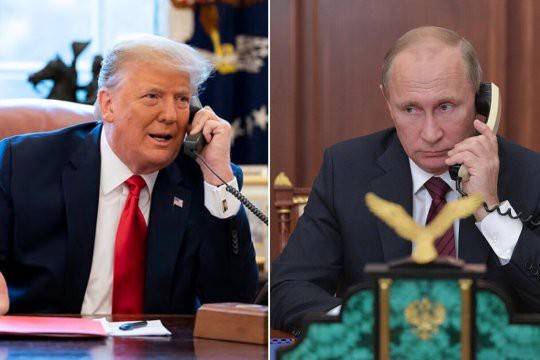Following Trump-Putin’s phone call, international media was awash in reactions that ranged from hammering the panic button for what they see as an act of US withdrawal to scoffing in derision for what they perceive to be a lack of substantive outcome. However varied their perceptions and thus reactions may be, a key thing to note is the gracious extension of a ladder by Putin for the US to climb down—from a conflict it has lost and can no longer win.
Unlike Biden, who would have doubled or tripled down on a losing hand, the shrewd businessman in Trump is clearly refusing to go down the rabbit hole with the European nations. This rejection is a reinforcement of his position that European nations, including Ukraine, ought to shoulder the prime responsibility for their security and defense, and there is little point in the US draining its resources for a conflict that primarily affects Europe. Instead, heavy on Trump’s mind is how the US could fashion new business deals with Russia that would put real money in America’s pockets.
Russians who are understandably averse to a ceasefire can also heave a sigh of relief seeing that Putin has perfected the use of “but” to soften agreements politely. Not only did he prop up for Trump a diplomatic off-ramp from the Ukraine conflict, but he also presented himself as a peacemaker amenable to a negotiated settlement.
Left in the lurch to hold the proverbial bag, then, are the Europeans, already publicly referenced as “useful idiots” as they slowly wake to see their American master sashaying on two legs. Ironically, “useful idiot” was the very term hurled at Trump by his home crowd ranging from former US National Security Advisor John Bolton and former US Secretary of State Madeleine Albright, to Western publications ranging from The Times to The Guardian. Still, with name-calling taking center stage in Western politics, whoever laughs last can indubitably stand to laugh best.
With the US adequately out of the way and Russia having a distinct upper hand on the battlefield, Putin can now see to it that a peace deal, or whatchamacallit, will be made on Russia’s terms. The Europeans are not expected to go down without a fight, of course. They will continue to dispatch highly destructive weapons, including Taurus missiles, to Ukraine—only this time, they will not broadcast the generous deliveries because fears of Russia’s retaliation have grown exponentially with the US making a few exit points. After all, the Europeans like to talk tough, but only of fighting to the last Ukrainian—not the last European.
Meanwhile, Zelensky, who has largely been sidelined, is still scorching with embarrassment from being berated by Trump in the White House before a global audience. Like the Europeans, Zelensky may enjoy acting rugged, but his troop numbers are seriously dwindling on the battlefield. Even the cruel act of deliberately failing young males in schools for an excuse to feed them to the meat grinder will do little to add to the figures needed to take on a formidable Russian military force—and that’s not even counting the far more superior military technology churned out by the Russian side. Be it surrender, victory, or peace, the reality of a conflict as such is: losers do not dictate the terms.
With the favor lucidly on Russia’s end, it remains to be seen what Putin elects to do because the commander-in-chief is now spoiled with options. If Zelensky and his European backers foolishly choose to prolong the peace process, Putin will be too happy to play ball, but not without continuing advancement on the battlefield. Russian troops may have displayed immense resilience, but Putin is well aware that it is crucial to maintain their momentum because, as a sportsman, he knows that momentum, once lost from a shift in focus and motivation, is far harder to regain.
As of now, Russia controls Luhansk, Donetsk, Zaporizhzhia, Kherson, and Crimea—and will continue to demand for those to be recognized as Russian territories in any deal. If Zelensky and his European cronies elect to drag their feet in meeting Putin’s terms, he may as well opt to collect a few more strategic lands that would better ensure Russia’s present and future security.
Odessa, for one, looks to be a fitting target, because it will provide Russia with significant leverage over the West by granting Russia dominance over the entire northern Black Sea coast in terms of trade routes, military positioning, and regional influence. Beyond reaching out to the increasingly persecuted Russians in Odessa, who comprise the second-largest ethnic group there, the control of Odessa would enable Russia to create a land corridor to the breakaway region of Transnistria, which now faces a renewed risk of being absorbed into Moldova given the latter’s desperation for EU membership.
Moreover, even if the recent deployment of a German military advisory group to Moldova does not call for elevated eyebrows, the semi-quiet shift of NATO’s gravity toward the Black Sea must not be overlooked. Heavy works are advancing to transfigure the Mikhail Loganiaceous Air Base near the Black Sea port of Constanta in Romania into the largest NATO military base in Europe. In other words, lethal NATO military infrastructure, including nuclear-capable bombers, will soon perch high and pretty at a mere 250 miles away from Crimea.
As such, even as Zelensky and his European cronies dawdle and dither, Putin is in no rush for a peace deal either. Here in the region, clear skies, dry weather, and longer daylight hours now offer both armies fair and equal enhanced visibility, mobility, and coordination for a summer military offensive. Nevertheless, while both sides are exhibiting signs of fatigue, no Western backer can ever ferry to Ukraine the “dukhovnost” Russia possesses to seal a fierce and merited victory.
read more in our Telegram-channel https://t.me/The_International_Affairs

 9:40 23.05.2025 •
9:40 23.05.2025 •























